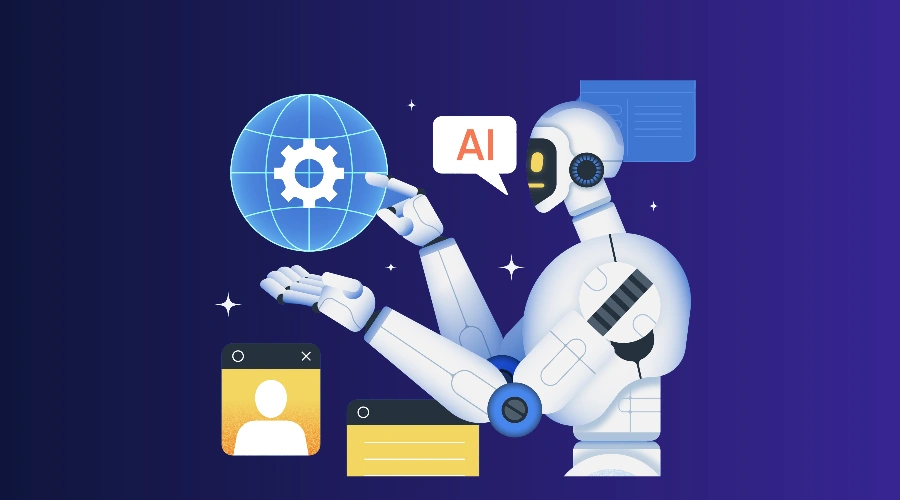Artificial Intelligence (AI) has long been the preserve of tech giants and well-funded organizations, but the landscape is changing rapidly. The democratization of AI is a movement aimed at making AI accessible to a broader range of people and organizations, from small businesses to individual developers and hobbyists. This shift is revolutionizing industries, driving innovation, and fostering a more inclusive technological future. In this blog, we'll explore what democratization of AI means, its benefits, challenges, and the key players driving this transformation.
What is Democratization of AI?
The democratization of AI refers to the process of making AI technologies and tools accessible to a wider audience, beyond the traditional boundaries of academia and large corporations. This involves simplifying AI development, lowering costs, and providing educational resources and platforms that enable more people to create and implement AI solutions.
Key Components of AI Democratization
- Open Source Tools and Frameworks: Open source AI tools and frameworks, such as TensorFlow, PyTorch, and Scikit-learn, have played a crucial role in democratizing AI. These tools are freely available, allowing anyone with a computer and an internet connection to experiment with AI.
- Cloud-Based AI Services: Cloud platforms like AWS, Google Cloud, and Microsoft Azure offer AI services that are scalable and cost-effective. These platforms provide pre-trained models, APIs, and development environments that simplify the process of building and deploying AI applications.
- AI Education and Training: Online courses, tutorials, and certifications from platforms like Coursera, Udacity, and edX have made AI education more accessible. These resources cater to different skill levels, from beginners to advanced practitioners.
- User-Friendly AI Tools: Tools like AutoML and drag-and-drop AI platforms allow users with little to no coding experience to develop AI models. These tools abstract the complexities of AI development, enabling a wider range of users to participate in AI projects.
Benefits of AI Democratization
- Innovation Across Industries: By making AI accessible to more people, we can drive innovation across various sectors. From healthcare and agriculture to finance and education, AI democratization allows for the development of solutions tailored to specific industry needs.
- Empowering Small Businesses: Small and medium-sized enterprises (SMEs) can leverage AI to gain a competitive edge. AI can help SMEs optimize operations, improve customer service, and create personalized marketing strategies without the need for large-scale investments.
- Solving Global Challenges: AI democratization enables more people to contribute to solving pressing global issues, such as climate change, healthcare accessibility, and poverty. Diverse perspectives and ideas can lead to more effective and inclusive solutions.
- Economic Growth: As more individuals and businesses adopt AI, there is potential for significant economic growth. New job opportunities are created, and existing roles are enhanced by AI, driving productivity and innovation.
Challenges in Democratizing AI
- Digital Divide: Access to technology and the internet remains uneven globally. Ensuring that AI democratization reaches underserved communities and developing countries is a significant challenge.
- Skill Gap: While educational resources are more accessible, there is still a considerable skill gap in AI expertise. Continuous efforts are needed to provide training and upskilling opportunities to bridge this gap.
- Ethical and Bias Concerns: AI systems can inadvertently perpetuate biases present in training data. Democratizing AI must include efforts to address and mitigate ethical concerns and biases in AI models.
- Data Privacy and Security: As more people engage with AI, safeguarding data privacy and security becomes paramount. Clear regulations and robust security measures are essential to protect sensitive information.
Key Players Driving AI Democratization
- Tech Giants: Companies like Google, Microsoft, and Amazon are leading the charge by providing accessible AI tools and cloud services. Their investments in AI research and development have made advanced AI technologies available to a broader audience.
- Educational Institutions: Universities and online learning platforms are crucial in educating the next generation of AI practitioners. Initiatives to offer free or low-cost AI courses are instrumental in spreading AI knowledge.
- Startups and Innovators: Startups are often at the forefront of developing user-friendly AI tools and applications. Their agility and innovative approaches contribute significantly to the democratization process.
- Governments and Non-Profits: Policy frameworks and funding from governments and non-profits can support AI democratization. These entities can help create inclusive AI ecosystems by investing in education, infrastructure, and ethical AI research.
The Future of AI Democratization
The future of AI democratization looks promising, with continued advancements in technology and growing awareness of its benefits. Here are some trends to watch:
- Increased Collaboration: Collaboration between tech companies, educational institutions, and governments will be key to overcoming challenges and driving widespread AI adoption.
- AI for Social Good: There will be a growing emphasis on using AI to address societal challenges. Initiatives focused on AI for social good will gain traction, fostering inclusive and equitable development.
- Advancements in Explainable AI: Making AI models more interpretable and transparent will be crucial for broader adoption. Explainable AI will help build trust and ensure ethical AI deployment.
- AI Regulation and Governance: As AI becomes more pervasive, robust regulatory frameworks will be necessary to address ethical concerns, bias, and data privacy issues. Governments will play a critical role in shaping these policies.
Conclusion
The democratization of AI holds immense potential to transform industries, empower individuals, and address global challenges. By making AI accessible to a wider audience, we can harness the collective intelligence and creativity of people from diverse backgrounds. However, to fully realize the benefits of AI democratization, we must address challenges related to the digital divide, skill gaps, and ethical concerns. Through collaborative efforts and continuous innovation, we can build a future where AI serves as a powerful tool for all, driving progress and prosperity.
The journey of AI democratization is just beginning, and its success depends on our collective commitment to inclusivity, education, and ethical practices. As we move forward, let's embrace the opportunities and responsibilities that come with democratizing AI, ensuring that its benefits are shared widely and equitably.

